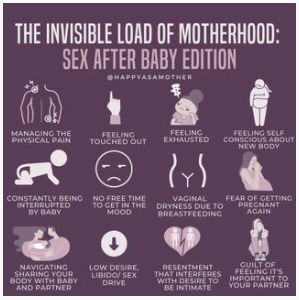Intimacy in Parenthood - Sex After Baby
By Arijana Palme, BSW, RSW
Client Coordinator
Registered Social Worker
Earlier this month, we wrote a blog about the ‘Accelerators’ and ‘Brakes’ that can affect how and when our sexual response systems become activated or inhibited.
The major takeaway; we are all unique in our sexual needs and it’s figuring out our own particular turn ons and turn offs that can pave the way for a fulfilling sex life.
More accelerators and fewer brakes, and maybe things start to jive just a little better, sparks fly a little higher, and ooey-gooey feels linger a little longer. Yum.
But then, you have kids.
Want to talk about it? We’re ready when you are.
Tiny little humans that are often a direct result of this sexual act (not in all cases, think same sex partners, surrogacy, adoption, blended families, etc). Nevertheless, they have a way of upending our lives in beautiful and frustrating ways, and one major disruption is in how much harder sex seems to become.
The Happy as a Mother team specializes in maternal mental healthcare and creates some lovely infographics for their social media sites. They focus on addressing the ‘Invisible load of motherhood’. These are aspects of parenting that create high mental, physical, emotional and spiritual loads for primary caregivers (often mothers, though not always) which society often overlooks or undervalues.
Well, they made a very useful one for this particular subject matter, take a look below.
Though they focus on ‘motherhood’ in this infographic, we know that this language doesn’t apply to everyone even though the experience of being a new parent can feel quite universal. So whether you identify more with motherhood, fatherhood, parenthood, step-parenthood, guardian-hood, polyfamily-hood, or another term that fits your life more accurately, the invisible load still exists.
If we think about the idea of Accelerators and Brakes, most of these items feel like they would add more to the Brakes column.
Exhaustion, body changes, pregnancy fears, interruptions from baby, and feeling touched out could all serve to activate the inhibitory sexual response system that just says “No way, I can’t get there right now.”
This is especially true when babies are very small or are high-needs and they require so much from their primary caregivers.
So while it may seem pretty gloomy to think about all of the ways kids and babies make sex harder, the flipside is that your turn ons (or accelerators) still exist. Maybe now, it simply takes more conscious effort to stack up your accelerators or eliminate the brakes that you can control (like lighting, temperature, location, etc). Finding the right balance between your excitatory and inhibitory stimuli is the key here.
Because so much changes when kids or babies enter the picture, it makes sense that the needs of our sexual response systems would change too. And sometimes, simply knowing that this can be a normal phase of your sexual experience can be enough to ease the stress, the feeling of failure, or the guilt of being unable to meet a partner’s sexual needs (at this moment).
Carly Fleming, director of everwell, was recently interviewed by Mel Peachey for the Surviving2Thriving Momcast about this very thing. They discuss how intimacy can change between partners and share some of their ideas on how to approach this issue in parenthood. Have a listen here.
Something important to add;
It isn’t always this simple. If you think your experience is linked to something more medical or deeply rooted, then seeking the guidance of a qualified professional is a great step to take.
Listen to that voice, it knows a lot.
Looking for some support?
If you’re thinking about therapy, then you’re already taking a step towards a vision of improved personal well being. Maybe now is the time, or a seed has been planted for the future. Either way, we’ll be here to support you when you’re ready - because you matter.
When you’re ready, we can help.
Book a free 30 minute consultation and let’s talk about it.


